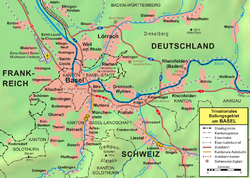Lörrach-Haagen
| Lörrach | ||
|---|---|---|

Aerial view at Lörrach from the north
|
||
|
||
| Coordinates: 47°37′N 7°40′E / 47.617°N 7.667°ECoordinates: 47°37′N 7°40′E / 47.617°N 7.667°E | ||
| Country | Germany | |
| State | Baden-Württemberg | |
| Admin. region | Freiburg | |
| District | Lörrach | |
| Government | ||
| • Mayor | Jörg Lutz | |
| Area | ||
| • Total | 39.43 km2 (15.22 sq mi) | |
| Elevation | 294 m (965 ft) | |
| Population (2015-12-31) | ||
| • Total | 49,303 | |
| • Density | 1,300/km2 (3,200/sq mi) | |
| Time zone | CET/CEST (UTC+1/+2) | |
| Postal codes | 79501-79541 | |
| Dialling codes | (+49) 07621 | |
| Vehicle registration | LÖ | |
| Website | loerrach.de | |
Lörrach German pronunciation: [ˈlœrax] is a city in southwest Germany, in the valley of the Wiese, close to the French and the Swiss borders. It is the capital of the district of Lörrach in Baden-Württemberg. The largest industry is the Milka chocolate factory. The city had a population of 10,794 in 1905 and of 47,707 in 2007.
Nearby is the castle of Rötteln on the Wiesental, whose lords became the counts of Hachberg and a residence of the Margraves of Baden; this was destroyed by the troops of Louis XIV in 1678, but was rebuilt in 1867. Lörrach received market rights in 1403, but it did not obtain the privileges of a city until 1682.
After the Napoleonic epoch, the town was included in the Grand Duchy of Baden. On September 21, 1848, Gustav Struve attempted to start a revolutionary uprising in Lörrach as part of the Revolutions of 1848-49. It failed, and Struve was caught and imprisoned. Still, Lörrach was officially the capital of Germany for a day.
Lörrach is the hometown of Ottmar Hitzfeld, one of the most successful and popular football managers in Germany.
Lörrach is located in the southernmost part of the Rhine Rift valley. The depression is created by tectonic movements, and the area has a high earthquake risk. Several times a year, Lörrach is afflicted by slight and medial earthquakes.
The city is located in a valley of the Quaternary period. Lörrach is surrounded by slopes on two sides. The slopes create the southern part of the Wiesental, that is the valley where the Wiese river flows.
...
Wikipedia



